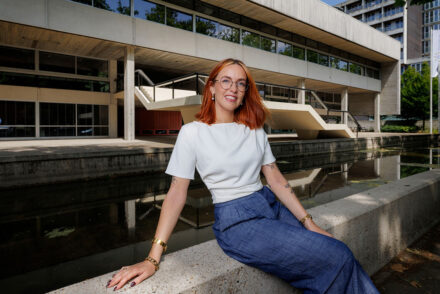University frees up more than two million to relieve workload
The coronavirus measures increase the workload in education. With the Impulse program, Tilburg University wants to provide relief. In the short term, 2.25 million euros will be invested.

The high workload at universities has been a problem for some time, but the coronavirus measures have not made it any better. “The signs are well known,” says Boudewijn Haverkort, Dean of Tilburg School of Humanities and Digital Sciences (TSHD). “The conversion of education requires considerable adjustments. Lecturers have a harder time separating work from private life because they work from home. They experience more pressure and fall ill more often, requiring colleagues to step in.”
The signs Haverkort and other Deans are picking up are confirmed by the results of the employee survey. “These show that seventy percent of the staff indicate that the amount of work has increased due to the coronavirus measures and that over sixty percent now experience a high workload,” says Jantine Schuit, Vice-Rector Magnificus and member of the Executive Board. “The wellbeing of our employees is deteriorating, which we find worrisome.”
Custom
Time for action, the Executive Board decided. Previously, the OCW subsidy scheme for coronavirus jobs offered scope to recruit approximately fifteen FTE of student employees for coronavirus-related work. Also, together with research financier NWO, one million euros has been set aside for the extension of temporary contracts of researchers. On top of this now comes the Impulse Program for Education (Impulsprogramma voor onderwijs).
Of the 2.25 million thus released, the Executive Board itself has made 0.75 million euros available from general reserves. This is divided among the Schools in proportion to the number of students. Then the Schools supplement the amount themselves from their own reserves, until the total amount of 2.25 million is reached. Schuit: “But a number of Schools even top this a little.”
‘We are fully committed to education for our students’
Schools can use the money for educational activities, to be spent flexibly from April 2021 to September 2022. “This is really a matter of customization,” says Schuit, “the Schools themselves have to look and decide how best to use the funds.”
Haverkort nods, “Within TSHD, for example, one Department benefits more from a student assistant and another Department benefits more from an experienced lecturer. We look at what is required and put full effort into the education of our students.”
Joint effort
The Impulse Program was set up by the Executive Board in collaboration with the five Deans. Haverkort praises this joint effort: “This is a unified and university-wide project. That makes it effective. This is better than when each School tries to solve the problem of workload on its own.”
But is it also enough? Earlier, WOinActie wrote an urgent letter to the Minister of Education Van Engelshoven stating that appointments of scientific and support staff should be increased by twenty percent. This would not even solve the worst bottlenecks, but only alleviate the worst pain, according to the action group.
Haverkort: “This is a first step. And a quick one. Because of the Impulse Program, I can definitely hire seven people, which makes a huge difference. This will definitely make a difference. Could it have been more? Yes, of course it could have been more, but it has to be feasible as well.”
Long term
That more needs to be done to bring the workload down structurally is something Schuit acknowledges. The university is therefore looking at the long term. “Money is not the only thing you should think about,” says Schuit.
“We also want to work more on the basis of trust. By reducing bureaucracy and, for example, by better structuring appraisal interviews, you can also remove a lot of work pressure. Less control, better procedures: there is still a lot to gain in that area.”
‘Employees must cope with the many changes’
This trust mentality is already reflected in the Impulse Program. Schools do not have to provide specific accountability for actual resource spending after the fact. Schuit: “The Executive Board thinks that the Deans, Academic Directors, and lecturers know best what is required. We want to give them that trust and freedom.”
Aftermath of the coronavirus
How the coronavirus measures continue to affect the university is uncertain for now. There is hope that the university can return to normal in September, with the start of the new academic year. But it remains a matter of reading the tea leaves. Schuit and Haverkort do warn that the influence of the coronavirus will continue once the virus has subsided.
“Of course I expect a huge psychological burden to go away when everyone can return to campus,” Haverkort says. “And the coronavirus has also brought us something positive in some ways. The lines within the university have become shorter and great strides have been made in the area of blended learning. But not everyone will be back to his/her old self right away.”
Schuit: “We expect that there will still be after-effects when the coronavirus pandemic is ‘over’, that many people will still be affected. Some people have lost friends or family, others have become ill themselves and are not completely recovered yet, and still others have to cope with the many changes of recent times. Therefore, even after the coronavirus, the university must continue to keep a close eye on the well-being of its employees.”






